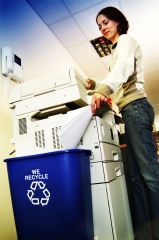
Minimise waste
Waste minimisation is not an additional part of recycling. It is about prevention - not producing the waste in the first place.
If businesses reduce waste, their process becomes more efficient. This will reduce costs and can make individual businesses more competitive.
Envirowise suggest that businesses across a range of industries can save 4% to 5% of turnover by taking steps to minimise waste.
There are many ways of reducing waste.
Here are a few simple examples to minimise waste paper in offices:
- create, read or review documents on your computer screen
- before printing multiple copies, print a single copy and check this copy for errors
- if you have to print out draft documents, use a small font or the 'shrink to fit' or zoom option available with many software packages
- print only when you really have to
- store data and reports on memory sticks or in cloud storage to save on paper copies
- use both sides of the paper when printing and photocopying
- staple scrap pieces of paper together to make a notepad instead of using new notebooks for rough notes
- keep a copy of A4 scrap paper next to the printer and photocopier for rough or trial copies
- use the smallest piece of paper possible for the job
- photocopy A3 to A4 if possible
- use staple free staplers to reduce use of metal staples
- send email memos instead of sending paper copies
- cancel unwanted subscriptions to avoid paper wastage
- buy only what you need - think of stock control and how to streamline processes across departments
- ask your staff to 'think before they throw' - someone else may want to use it
Waste minimisation should be a long term business practice.
Reuse waste
Reuse is when you can use an item again without going through the recycling process. For example:
- reuse files and folders
- reuse envelopes (can be used for internal mail in larger organisations) or use a 'multi address sheet' to prolong the life of internal envelopes
- reuse padded postal bags (add a new address label)
- shredded paper and newspapers can be reused for packaging
- re-fill toner and inkjet cartridges
- use waste paper as note paper
- use cups, mugs and glasses rather than disposable plastic and paper cups
There are ways in which you can reuse items, for example donating to charity shops.
Some charity shops accept printer inkjet cartridges and mobile phones.
You can pick a charity and recycle the company's phones. The charity can receive a small amount of money in return.
They may be able to get you a box to collect phones and inkjet cartridges or can arrange pick up for more than 20 phones. Information is available on charity websites.
You may be able to donate old office furniture to a charity, sell on an online auction website or app, over social media or use Freecycle.
Check if your waste is useful to another business. For example, if you produce wood off cuts from your business this may be of use to someone who uses a wood burning stove.
Recycle waste
The number of organisations that offer recycling for businesses is growing.
Your current waste collection company will be able to tell you whether they offer separate collections for any of your specific wastes.
Your local council may offer recycling as well as general waste collection services.
Compost waste
Your local council may be able to offer a collection of your compostable wastes such as kitchen food products and garden waste.
If you generate small quantities of compostable waste and wish to turn it into compost you could buy your own home composter or wormery. You can get these online or at DIY and garden centres.
For more information on composters go to Recycle now.
Benefits of reducing and reusing waste
It's easy
Reducing, reusing and recycling at work is easy to do. It's easy to use less, reuse what you can and separate out materials to recycle from your other waste. All you have to do is get a good system in place.
It saves money
Managing waste poorly costs money. By reducing and reusing your waste you could significantly lessen your waste disposal costs.
It saves space and can reduce clutter
Reducing, reusing and recycling often clears clutter and improves the working environment. Less clutter also makes your workplace safer.
It's good for the environment
By minimising waste you are reducing the amount of raw materials and the environmental impact of your business.
It's good for public relations
Good waste management is good for business. Promoting yourself positively to customers, clients and staff as being an environmentally responsible company can only be good, however negative publicity through lack of compliance or illegal dumping can only be bad.
It feels good
The feel good factor is undeniable. Ask your staff if they would like to do their bit, we are sure you will be encouraged by the response.
Fulfil your legal obligations
Through environmental legislation, producers of waste are ultimately responsible for its disposal, so you need to know and be able to document where your waste is going – be it recycling, composting, incineration or landfill.